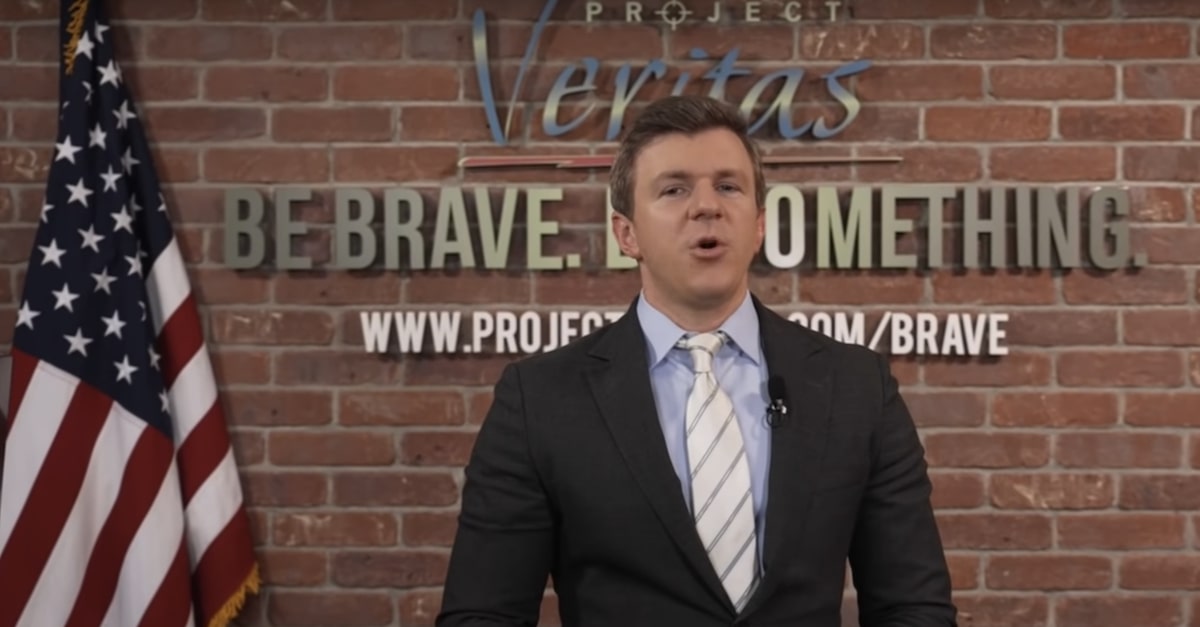
Project Veritas founder James O’Keefe describes the FBI’s raid on a staffer’s home in a YouTube video.
Project Veritas cannot dismiss a defamation lawsuit from a postmaster in Pennsylvania who says the group smeared him by running “fabricated” claims that he backdated mail-in ballots to sway the outcome of the 2020 presidential election for Joe Biden, a judge ruled.
The Erie postmaster, Robert Weisenbach, says he was actually a Donald Trump supporter who voted for the 45th president on Election Day. He says that did not stop Project Veritas from running a “fabricated” story by an alleged anonymous “whistleblower” who described Weisenbach as a “Trump hater” and claimed to have overheard him plotting to backdate ballots.
The so-called “whistle-blower,” U.S. Postal Service employee Richard Hopkins, recanted his remarks to the inspector general. Hopkins later asserted his about-face was coerced and reaped a windfall, making $130,000 over GoFundMe before that account was suspended and $236,000 over GiveSendGo, according to the lawsuit.
Weisenbach says that the damage was done. Trump amplified the false claims of voter fraud, and Weisenbach had to leave his home with his family and shelter in a hotel after receiving hate mail and threats, according to his lawsuit.
On Thursday evening, a judge with the Erie County Court of Common Pleas gave Weisenbach the green light to pursue his claims against Hopkins, Project Veritas, and its founder James O’Keefe.
Judge Marshall Piccini rejected Project Veritas’s reading of the Supreme Court First Amendment precedent in Gertz, finding the group selectively quoted the ruling’s observation that the Constitution recognizes “there is no such thing as a false idea.”
“They omit the following, equally significant, passage located a few lines below: ‘The need to avoid self-censorship by the news media is, however, not the only societal value at issue. If it were, this Court would have embraced long ago the view that publishers and broadcasters enjoy an unconditional and indefeasible immunity from liability for defamation,'” Piccini’s opinion states.
“The constitutional deck is not all stacked to one side,” the judge added.
Under the standard set by the Supreme Court’s landmark ruling of New York Times vs. Sullivan, public figures suing for defamation must prove actual malice. That can be achieved by showing someone knowingly made a false statement or displayed reckless disregard for the truth.
Weisenbach, a postmaster at a roughly 96,000-population U.S. city, disputes that he qualifies as a public official, but the judge said that he did not have to decide that issue at this time because Weisenbach plausibly alleged actual malice.
“Beginning with Project Veritas and O’Keefe, Weisenbach avers that the media Defendants took a tendentious approach with Hopkins, drafting his affidavit, encouraging him to solicit donations, helping him set up crowdsourcing accounts, flying him to New York for an interview, ‘and retaining legal counsel on his behalf,'” the ruling states.
Project Veritas refused to retract the story even after the Post Office Inspector General found “no evidence” to support Hopkins’ claims, Weisenbach noted.
“Taken together, these facts, if ultimately proven, could be credited as circumstantial evidence that Project Veritas and O’Keefe fabricated evidence to bolster their story, or at least harbored serious doubts as to the truth of Hopkins’ claims,” the ruling says.
Weisenbach says he got swept up in Project Veritas’ agenda to sow doubt in voting systems.
“Specifically, it is alleged that Project Veritas was engaged in an initiative codenamed ‘Diamond Dog’ to ‘erode confidence in the security of mail-in voting,'” the ruling states. “This included the publishing of stories purporting to document instances of illegal ‘ballot harvesting.'”
The lawsuit pointed to an extended gap in the audio run by Project Veritas.
“For instance, as to the recording posted by Project Veritas, Weisenbach alleges that roughly one hour of audio is missing, begging the question ‘what happened to the other sixty-plus (60+) minutes of audio?'” the ruling notes.
Judge Piccini noted that speech protected in a free society is not absolute.
“In this way, New York Times and its progeny strike a careful balance between the standards of journalistic integrity that a pluralistic society dedicated to the free exchange of ideas must tolerate, and that which it need not,” the ruling states.
Protect Democracy, a group whose lead counsel David Huock represents Weisenbach, applauded the ruling.
“The court’s decision is a victory for Mr. Weisenbach, our system of government, and, more broadly, democracy itself,” the group said in a statement. “Deliberate lies — and especially lies about elections — undermine government and the functioning of our democracy. They also often inflict grievous harm on victims who’ve done nothing wrong.”
Project Veritas’s press secretary R.C. Maxwell played down the victory as a “common procedural ruling.”
“The ruling does not address the substantive merits of the suit and the judge cautioned that the ‘difficulty may come in eventually proving subjective knowledge of falsity or probable falsity by clear and convincing evidence,'” Maxwell told Law&Crime in a statement.
“We welcome the opportunity to show, once again, that Project Veritas was well within its First Amendment rights in reporting this story to the American public and did so ethically,” he claimed. “We will win. It will just take longer than it should have.”
Some First Amendment scholars — typically wary of defamation lawsuits’ constraints on a free press — have sided with plaintiffs in certain cases involving 2020 election misinformation. In March, Weisenbach’s case against Project Veritas was featured in a New York Times profile: “First Amendment Scholars Want to See the Media Lose These Cases.”
Other lawsuits mentioned in the Times story include those filed by voting machine companies Dominion and Smartmatic against Fox News, Newsmax, and One America News.
Update—July 19 at 5:29 p.m. Eastern Time: This story has been updated to include Project Veritas’s comment.
Read the ruling below:
(Screenshot from YouTube)